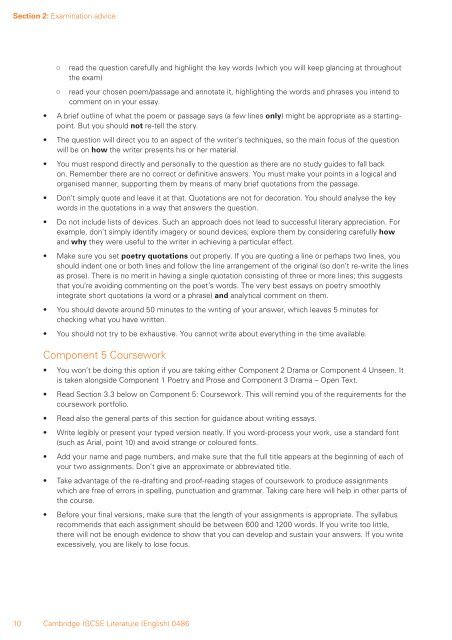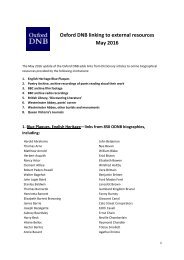Learner Guide
163029-cambridge-learner-guide-for-igcse-english-literature
163029-cambridge-learner-guide-for-igcse-english-literature
Create successful ePaper yourself
Turn your PDF publications into a flip-book with our unique Google optimized e-Paper software.
Section 2: Examination advice<br />
○<br />
○<br />
read the question carefully and highlight the key words (which you will keep glancing at throughout<br />
the exam)<br />
read your chosen poem/passage and annotate it, highlighting the words and phrases you intend to<br />
comment on in your essay.<br />
• A brief outline of what the poem or passage says (a few lines only) might be appropriate as a startingpoint.<br />
But you should not re-tell the story.<br />
• The question will direct you to an aspect of the writer’s techniques, so the main focus of the question<br />
will be on how the writer presents his or her material.<br />
• You must respond directly and personally to the question as there are no study guides to fall back<br />
on. Remember there are no correct or definitive answers. You must make your points in a logical and<br />
organised manner, supporting them by means of many brief quotations from the passage.<br />
• Don’t simply quote and leave it at that. Quotations are not for decoration. You should analyse the key<br />
words in the quotations in a way that answers the question.<br />
• Do not include lists of devices. Such an approach does not lead to successful literary appreciation. For<br />
example, don’t simply identify imagery or sound devices; explore them by considering carefully how<br />
and why they were useful to the writer in achieving a particular effect.<br />
• Make sure you set poetry quotations out properly. If you are quoting a line or perhaps two lines, you<br />
should indent one or both lines and follow the line arrangement of the original (so don’t re-write the lines<br />
as prose). There is no merit in having a single quotation consisting of three or more lines; this suggests<br />
that you’re avoiding commenting on the poet’s words. The very best essays on poetry smoothly<br />
integrate short quotations (a word or a phrase) and analytical comment on them.<br />
• You should devote around 50 minutes to the writing of your answer, which leaves 5 minutes for<br />
checking what you have written.<br />
• You should not try to be exhaustive. You cannot write about everything in the time available.<br />
Component 5 Coursework<br />
• You won’t be doing this option if you are taking either Component 2 Drama or Component 4 Unseen. It<br />
is taken alongside Component 1 Poetry and Prose and Component 3 Drama – Open Text.<br />
• Read Section 3.3 below on Component 5: Coursework. This will remind you of the requirements for the<br />
coursework portfolio.<br />
• Read also the general parts of this section for guidance about writing essays.<br />
• Write legibly or present your typed version neatly. If you word-process your work, use a standard font<br />
(such as Arial, point 10) and avoid strange or coloured fonts.<br />
• Add your name and page numbers, and make sure that the full title appears at the beginning of each of<br />
your two assignments. Don’t give an approximate or abbreviated title.<br />
• Take advantage of the re-drafting and proof-reading stages of coursework to produce assignments<br />
which are free of errors in spelling, punctuation and grammar. Taking care here will help in other parts of<br />
the course.<br />
• Before your final versions, make sure that the length of your assignments is appropriate. The syllabus<br />
recommends that each assignment should be between 600 and 1200 words. If you write too little,<br />
there will not be enough evidence to show that you can develop and sustain your answers. If you write<br />
excessively, you are likely to lose focus.<br />
10 Cambridge IGCSE Literature (English) 0486




